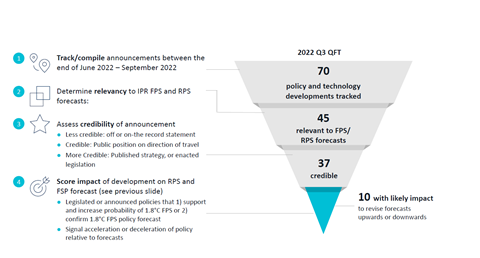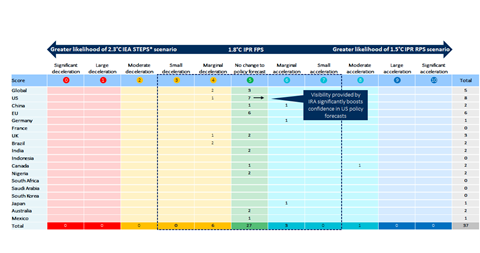This third QFT update covers the period from July to September 2022
In Q3 2022 IPR continues to track policy and technology momentum around achieving a 1.8C climate objective (Forecast Policy Response scenario) while falling well short of 1.5⁰C (Required Policy Scenario)
-
The Quarterly Forecast Tracker monitors momentum and level of ambition on global energy and land transition policy and technology developments. These are assessed against the IPR Forecast Policy Scenario (FPS) which results in 1.8⁰C of warming and are also in the context of the 1.5⁰C Required Policy Scenario (RPS).
-
In Q3 there is still positive momentum reinforcing a 1.8⁰C pathway.
-
For Q3 2022 we track 37 policy and technology developments as having credible impact with 27 supporting or confirming our 1.8C forecast, 4 that provide evidence of increased ambition and 6 indicating a deceleration relative to forecasts.
-
With recent US and Australia climate legislation providing policy tailwinds, we have increased confidence in policy momentum towards IPR 1.8⁰C FPS for the bulk of OECD nations.
-
The US has passed the Inflation Reduction Act (IRA), which creates significant momentum in the climate transition. The climate policy package, which includes ~US$400 billion in funding over the next ten years to support clean manufacturing, renewable energy, transportation electrification, and climate-smart agriculture, is broadly supportive of the US NDC and provides substantial visibility and confidence in US policy forecasts.
-
An accompanying IPR paper by Kaya Advisory shows that up to US$1 trillion dollars of climate stimulus is now in the US system.
-
In non-OECD countries, where emission reductions are forecast to be slower due to rapid growth in energy demand, we see policy ambition continues to build in China along new supportive announcements from India, Mexico and Nigeria.
-
Energy Security continues to be a central driver since the war in Ukraine. We have maintained that emissions trajectories are still manageable through capacity utilization and EU prospects for renewable power and heat, energy efficiency and hydrogen. Against this backdrop, the EU continues to face delays to expansion of the ETS as part of the Fit for 55 package.
-
However, this quarter has also however seen a potential weakening in international agreement. A previous G7 commitment to end international fossil fuel financing has been undermined by a call for temporary investment into gas infrastructure. G20 climate leaders also failed to agree in September on a joint communique over language used on climate targets (e.g., 1.5°C versus 1.8°C), climate finance and the war in Ukraine.
-
We continue to track the increasing importance of Just Transition concepts in policies reflected in the IPR Quarterly Forecast Tracker. Our Q3 JT assessment has seen a continuation of engagement with Just Transition issues in the US and Europe identified in our Q2 assessment, although Europe’s response to the energy crisis has shown only weak to moderate engagement with the Just Transition imperative. So far, Australia’s new climate policy has yet to manifest strong Just Transition elements. Nigeria has also issued an Energy Transition Plan that includes Just Transition elements, including an emphasis on universal energy access, but where details remain high-level.
-
On technology and land use developments there have been positive trends in renewables and EV deployment and in hydrogen, battery, and alternative protein innovation. Deforestation trends in Brazil continue to be of concern.
-
Overall while there are still significant challenges, we believe developments are confirmatory of FPS 1.8⁰C while falling well short of RPS 1.5⁰C.
Quarter 3 Assessment Process
IPR QFT assessments adopts a multi-step approach to assessing key policy and technology developments impacting the IPR 1.8C FPS and 1.5C RPS

Quarter 3 Heat Map
In Q3, we are still tracking momentum around 1.8C FPS
-
This assessment covers the period from end of June to end of September 2022
-
The IEA’s ‘Stated Policy Scenario’ or STEPS reflects current policy settings based on a sector-by-sector assessment of the specific policies that are in place, as well as those that have been announced by governments

Just Transition
-
An accompanying paper by the LSE finds recent developments in international policy-making confirm that the Just Transition has become a critical concept in international policy-debates, with growing awareness that JT elements are crucial for effective and lasting implementation
-
This Assessment finds Just Transition progress varies across regions. So far, 2022 policies reviewed in Europe, North America, and South Africa included the strongest Just Transition elements. However, not all just transition elements will be required in all policies, so the strength of each policy must be considered in the context of national circumstances.
-
Q3 has seen a continuation of the regional engagement with Just Transition issues in the US and Europe identified in the first half of the year, although Europe’s response to the energy crisis has shown only weak to moderate engagement with the Just Transition imperative. So far, Australia’s new climate policy has yet to manifest strong Just Transition elements. Nigeria has also issued an Energy Transition Plan that includes Just Transition elements, including an emphasis on universal energy access, but where details remain high-level.
-
In many cases, Just Transition elements in recent policies are absent or could be considerably stronger. As policies shift to implementation phase, JT elements could feature more prominently.
Read more
IPR Special Paper: The US Discovers its Climate Policy: A holistic assessment and implications
IPR Special Assessment: Assessment of Just Transition elements in the Inevitable Policy Response (Q3 2022)
Previous quarter papers and assessments
IPR Special Paper: Can Lula save the Amazon? A Brazil Policy Analysis
IPR Special Paper: Ukraine War: The new geo-politics of energy and implications for climate policy
IPR Special Assessment: An assessment of Just Transition elements in the Inevitable Policy Response (Q1 and Q2 2022)
QFT in 2022
QFT #1 Report covering developments from COP26 to the end of March 2022 is available here.
QFT #2 Report covering Q2 2022 developments is available here.
Each QFT release is accompanied by a Webinar discussing key findings.
Scheduling and details are posted on the PRI Events Page and IPR Social Media:
IPR Briefings
For more information on IPR, signatory briefings and presentations, please contact us at [email protected]
Downloads
Q3 2022 Quarterly Forecast Tracker
PDF, Size 1.28 mbIPR Just Transition Assessment
PDF, Size 0.92 mb












